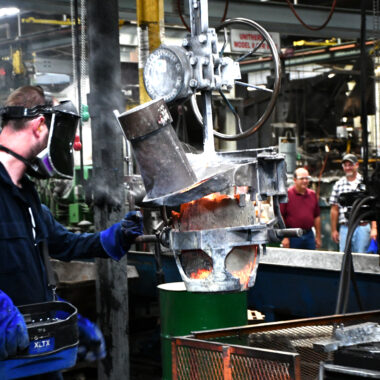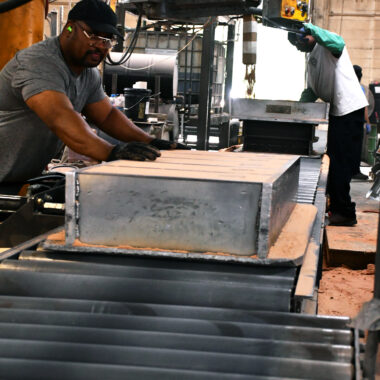Elevate Your Craft: Expert Insights right into Casting Aluminum
Elevate Your Craft: Expert Insights right into Casting Aluminum
Blog Article
Specialist Light Weight Aluminum Casting Providers: Your Ultimate Overview
In the realm of production and engineering, the significance of light weight aluminum spreading services can not be overemphasized. As we begin on this exploration of professional aluminum spreading services, we will certainly reveal necessary understandings that can elevate your projects to brand-new heights of accuracy and performance.
Benefits of Light Weight Aluminum Casting Services
Light weight aluminum casting solutions supply a cost-effective and reliable approach for producing high-quality metal elements. Among the key advantages of using aluminum spreading services is the flexibility it uses in producing complex and detailed shapes that might be challenging to create using other manufacturing techniques. The procedure enables for the production of parts with thin walls, great details, and smooth surfaces, making it ideal for a large range of markets such as vehicle, aerospace, and electronics.
Furthermore, light weight aluminum casting solutions use excellent dimensional accuracy and consistency, making certain that each part fulfills the needed specifications. This integrity is crucial for markets where precision and harmony are paramount. In addition, aluminum is a lightweight material with high strength-to-weight proportion, making it a perfect selection for applications where weight decrease is vital without endangering on sturdiness.
Additionally, light weight aluminum casting is a highly scalable manufacturing procedure, capable of creating little to huge batches of parts successfully. This scalability makes it an affordable option for both prototyping and mass manufacturing, supplying versatility to adapt to varying production needs. On the whole, the benefits of aluminum spreading solutions make it a recommended selection for sectors seeking high-quality, economical steel components.
Sorts Of Light Weight Aluminum Casting Procedures
Given the diverse benefits that aluminum casting services provide, it is necessary to understand the various kinds of procedures entailed in casting light weight aluminum elements. Aluminum casting processes are broadly classified right into 2 main types: expendable mold and mildew casting and permanent mold spreading.
Expendable mold and mildew casting includes approaches like sand casting, investment casting, and plaster mold spreading. Sand spreading is among one of the most functional and common approaches, appropriate for both tiny and massive manufacturing. Financial investment spreading, likewise understood as lost-wax spreading, is chosen for detailed styles and high precision. Plaster mold spreading, on the other hand, is utilized for generating components with smooth surface areas and fine information.
Permanent mold and mildew spreading entails procedures like die spreading and long-term mold casting. Comprehending these different types of aluminum casting processes is essential for selecting the most ideal approach for particular project requirements.
Variables to Take Into Consideration When Choosing a Company
When selecting a solution copyright for light weight aluminum spreading solutions, what crucial aspects should be thought about to make sure an effective partnership? One important element to evaluate is the supplier's experience and competence in light weight aluminum casting. Search for a company with a proven performance history in supplying high-quality aluminum spreadings that meet industry criteria. Additionally, consider the provider's abilities in regards to casting intricacy, size, and material alternatives to ensure they straighten with your task needs. It is likewise vital to evaluate the provider's high quality control measures and qualifications to assure the uniformity and reliability of their castings.

Quality Assurance Steps in Aluminum Spreading

Additionally, executing standard procedures and procedures for quality assurance helps in decreasing errors and discrepancies during casting. Routine calibration of devices and devices is important to guarantee exact measurements and casting specifications are go right here met. Quality assurance actions additionally entail thorough screening of the chemical structure and mechanical residential properties of the light weight aluminum material prior to and after casting to verify its stability and adherence to required standards.

Tips for Effective Aluminum Spreading Projects
Making sure the success of light weight aluminum spreading jobs depends greatly on applying critical guidelines to enhance the casting procedure and enhance total task end results. To achieve this, it is critical to start by thoroughly creating the mold to fulfill the particular demands of the project - casting aluminum. The mold and mildew layout must think about elements such as product flow, cooling down prices, and potential problems to guarantee a high-grade end product
Furthermore, selecting the appropriate aluminum alloy is vital. Different alloys have differing homes that can dramatically impact the casting procedure and the last item's characteristics. Recognizing the one-of-a-kind buildings of each alloy and selecting the most ideal one for the task can cause improved results.
Furthermore, preserving correct spreading temperature levels and making certain constant surveillance throughout the procedure is necessary. Temperature variants can influence the quality of the spreadings, so it is vital to very closely keep an eye on and manage these criteria.
Last but not least, post-casting procedures such as warmth treatment and surface area ending up ought to not be neglected. These steps can even more enhance the mechanical homes and appearances of the last aluminum spreadings, adding to the general success of the job.
Conclusion
Finally, light weight aluminum spreading solutions offer various advantages and come in numerous procedures. When choosing a provider, it is critical to think about aspects such as experience, quality, and reputation control procedures. By applying proper quality assurance measures and following expert suggestions, effective light weight aluminum casting tasks can be accomplished. It is vital to choose a reputable provider to make certain the success of your light weight aluminum casting jobs.
Expendable mold and mildew spreading consists of approaches like sand spreading, investment casting, and plaster mold spreading (casting aluminum). Investment spreading, likewise understood as lost-wax casting, is liked for elaborate layouts and high precision.Long-term mold and mildew spreading involves procedures like die spreading and irreversible mold and mildew spreading.When picking a solution company for light weight aluminum casting solutions, what key aspects should be taken into consideration to ensure a successful partnership?Making certain the success of aluminum spreading tasks counts heavily on applying critical standards to maximize the casting procedure and browse around this site improve overall task end results
Report this page